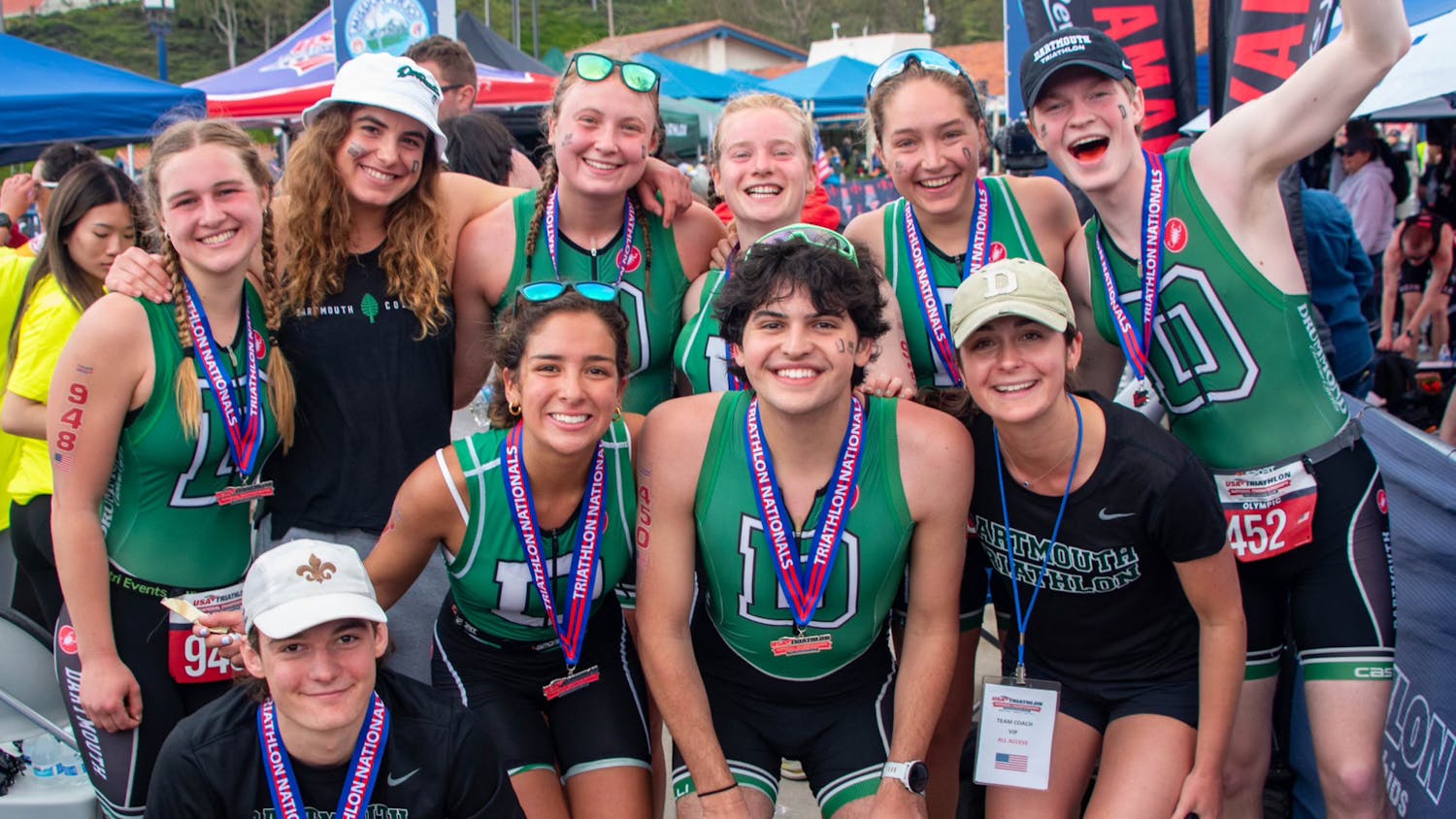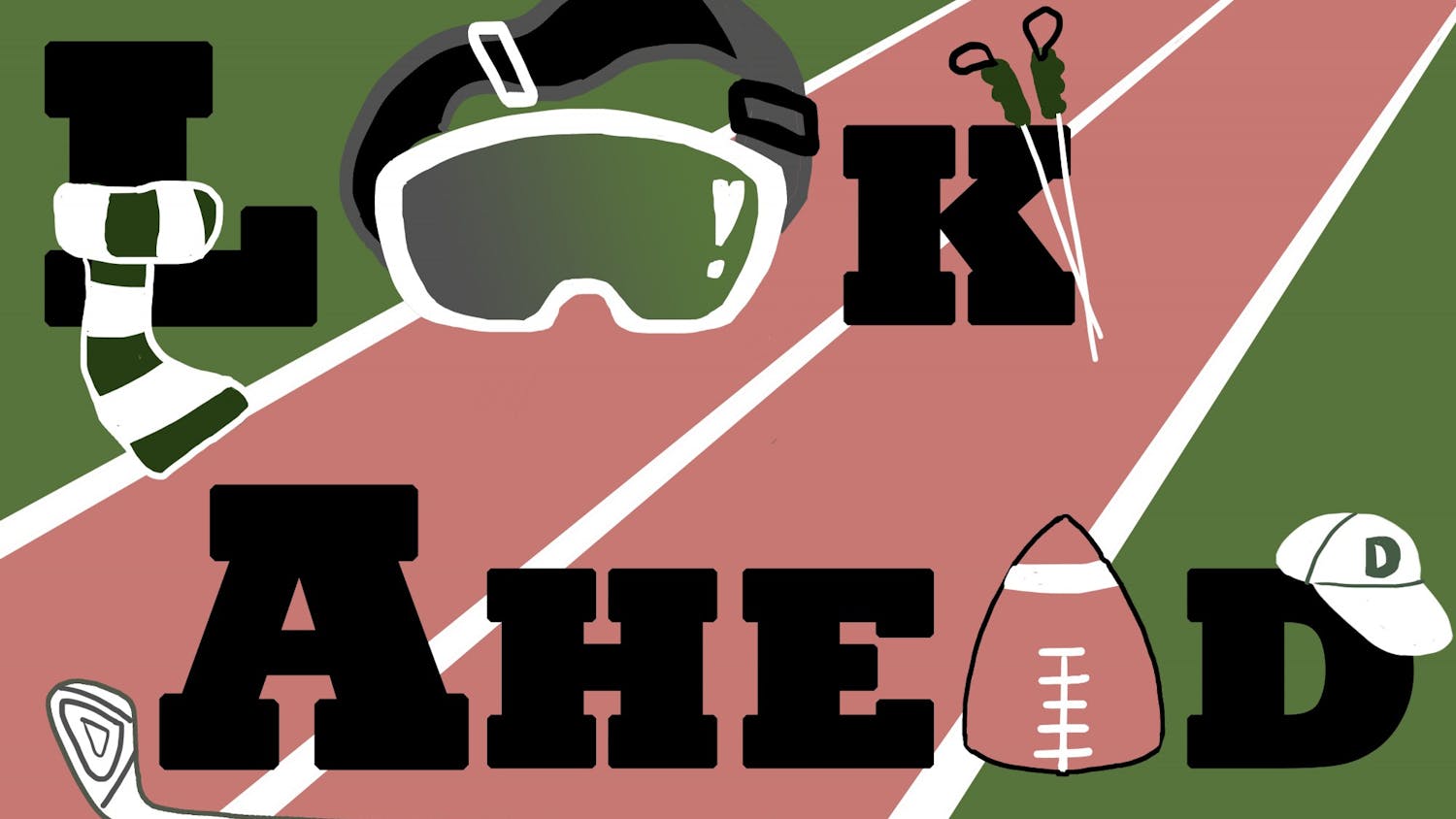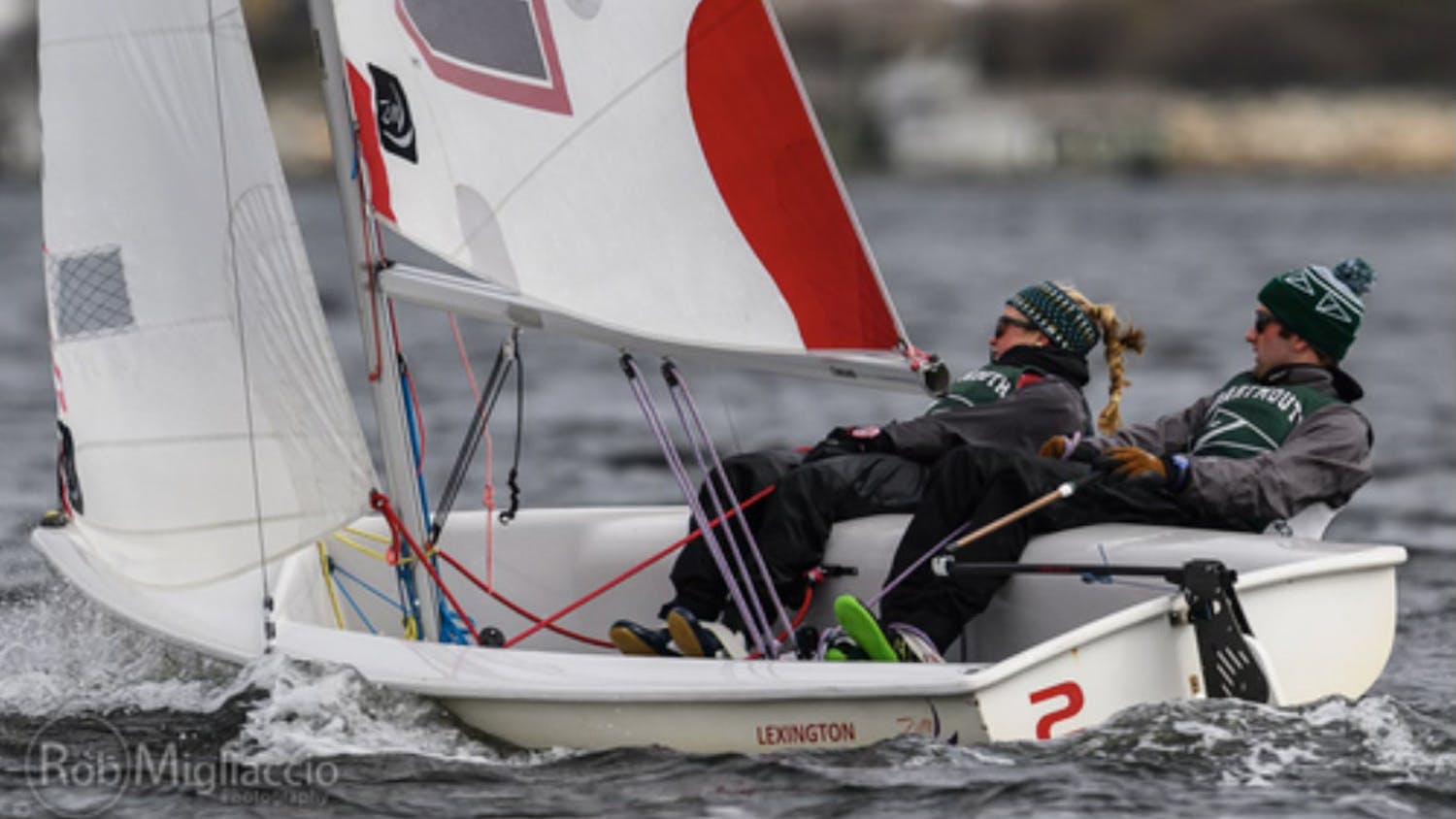In what can only be described as an unforeseen rarity in the context of a dominant 2015 season, the football team — which had previously been blowing out opponents by an average of almost 25 points — experienced its first close call of the season on Saturday against Columbia University.
Leading by four with four minutes remaining, the offense had an opportunity to seal the win over the Lions. The offense, however, was unable to string a successful drive together, and it was left up to the defense — the more consistent of the team’s two superb units — to stave off one last opposing push from Columbia. Having yielded a first down as the visitors marched to midfield, the defense stiffened up over the next four downs, capped by an interception from Charlie Miller ’17 as the Big Green (6-0, 3-0) escaped with a nerve-wracking 13-9 win over the Lions (1-5, 0-3).
Playing in its first game as a nationally ranked team since 1996, the No. 25 Big Green found a way to maintain its unblemished 2015 record. Moreover, reaching 6-0 portends favorably — in the five previous times Dartmouth began at that pace it ended the season by winning the Ivy League title.
While the Columbia defense neutralized the home team’s offense better than any prior opponent, penalties plagued Dartmouth like never before. Already a spot of concern for the team, the Big Green suffered heavily from 17 fouls that set Dartmouth back 161 yards — setting two unfavorable school records — and concentrated more in the latter stages of the game. The high penalty numbers at several times came as a result of questionable officiating decisions. The calls — along with five on Columbia — translated into a highly unusual game that lacked rhythm or continuity.
“I saw the officials getting iced down in the training room just after [the game], it’s one of the strangest ball games that I’ve seen,” Dartmouth head coach Buddy Teevens said in the first thoughts he expressed about the game.
Dalyn Williams ’16 finished below his lofty 2015 standards with 20-34 passing for 235 yards and a touchdown and not much success on the ground. Apart from the referees’ whistle, a ferocious Columbia pass rush that sacked the Dartmouth quarterback six times impeded Williams’ progress most of all on Saturday.
In what mirrored the contest against Central Connecticut State University one week ago, Williams and company were playing to their fullest potential to start the game. On the opening drive of the game, Williams easily picked apart a seemingly overmatched Lion defense, completing all five of his passes for 51 yards, throwing to receivers who found plenty of open space in a leaky coverage unit. After a fourth down conversion, Williams ran an option play right and pitched the ball to Abrm McQuarters ’17, who went 20 yards down the sideline for the opening touchdown within the first five minutes of play.
The steady stream of penalty flags, however, was already flowing. On the punt return play when Dartmouth next received the ball, linebacker Will Konstant ’16 laid a crunching block on a Columbia defender that earned him a personal foul, as well as a targeting call resulting in his ejection from the game. Though replays indicated a hit at shoulder level, the decision stood as officials do not have access to reviews. Within the first 10 minutes of play, Dartmouth already had four penalties that netted 27 yards.
Moreover, these penalties caused an unbalanced field position and led to the Lions’ first points of the game. The miscues moved Dartmouth to its own three-yard line and compounded a poor first punt by Ben Kepley ’17 — overshadowed by a terrific punting performance otherwise — that gave Columbia the ball at the Big Green 38. The Lions only needed one first down to set up a 31-yard field goal, cutting their deficit to 7-3.
On each of the remaining offensive drives during the first half for Dartmouth, penalties and quarterback pressure severely hampered any momentum the offense had generated in its first possession. After a third down sack ended the second drive, a blind side hit on the next drive by Columbia defensive tackle Lord Hyeamang on Williams — who tried to spin away from the hit — popped the ball loose, and Columbia pounced on the recovery. The play merely presaged what was to come, as constant blitzes and pressure from the edges affected Williams on nearly every play.
Passing plays quickly broke down which forced Williams to survey his receivers quickly and make throws on the run, precluding adequate time to stand in the pocket. Because of this pressure, Williams’s accuracy was noticeably askew. Throughout the half and most of the game, the senior overthrew his receivers on multiple long throws in unseemly fashion and could not develop a rapport with his wideouts on short passes either.
On its second to last possession in the first half, Dartmouth made a key adjustment. Knowing the defense’s pass rush proclivity, the offense called a screen pass that perfectly counteracted the pressure Columbia was consistently sending, as Williams threw the screen to Ryder Stone ’18 for a quick 13-yard first down. With the defense on its feet, Williams then uncorked a 41-yard pass that found Victor Williams ’16 on his back shoulder on the next play. A quick snap ensued, and Dalyn Williams found his namesake wideout once again open for a five-yard touchdown. After a blocked extra point, the score stood 13-3 in Dartmouth’s favor. By halftime, Dalyn Williams had accumulated 186 yards on a 15-26 clip, but had thrown under 50 percent following the first drive.
On the other side of the ball, the Big Green defense stayed in characteristic form during the first half. Namely, the unit forced Columbia into three-and-outs on five of its first six drives of the game. For a span that lasted more than 15 minutes in the middle of the first half, the Lions failed to muster a single first down. At the halftime break, Dartmouth had conceded a paltry 52 yards and three first downs.
Yet, the defense suffered its first and only mishap in the opening minutes of the second half. In its most successful possession on the day, Columbia capitalized on an effective pass-run mix and short methodical gains to move upfield. On the 13th play of a seven-minute long drive, Columbia quarterback Skyler Mornhinweg found his receiver Dylan Weldon for a short touchdown pass. A missed extra point kept the score at 13-9.
Over the next four opposing possessions, the unit yielded no ground once again in forcing four consecutive three-and-outs.
Meanwhile, the Big Green offense still struggled to find some stability. Dalyn Williams, constantly forced to scramble out of the pocket, continued to receive big hits and misfire on his long throws. On top of this difficulty, the officials — who rankled Dartmouth coaches, players and fans alike — provided no help. After a 49-yard run by Stone put Dartmouth in opposing territory, Dalyn Williams connected with Victor Williams on a deep throw in the left corner of the end zone, but was called incomplete. Yet upon replay review, the receiver clearly had the necessary one foot down after hauling in the ball.
Furthermore, in a contest that progressively increased in aggression from both sides as the game went along, penalty flags disproportionately targeted the Big Green. Eight penalties were called on Dartmouth in the fourth quarter, three of which came on unsportsmanlike conducts. Seven penalties were enforced for 80 yards, and all of which helped offset the 112 yards amassed by the offense in the quarter. On an unsportsmanlike conduct penalty called on Stone, video replay shows an exaggerated recoil by a Lion defender. Columbia, on the other hand, was called for just one penalty in this same time frame.
Among the most damaging effects of the penalties, the constant interruptions and setbacks disrupted any offensive rhythm.
“It’s close to impossible,” Teevens said about developing the offense with so many flags flying around. “I think in the second half every single series [had] a 15-yard penalty. [With] the dead ball fouls, you lose the down and 15 yards, so to try to make that up. There’s not enough plays in the playbook to try to figure that out.”
Yet, Dartmouth ultimately managed to overcome its first true test of adversity, which came in many forms on the field. An interception by Miller with 21 seconds left in the game marked a fitting conclusion, as the defense unquestionably guided the team in its closest game in almost a calendar year, garnering the praise of the team’s quarterback in the process.
“Offensively, we didn’t execute the way we thought we were going to,” Williams said. “Our defense came out and did a really good job, did their part, kept us in the game [and] gave us great field position. They played their hearts out.”
By the end of the contest, Dartmouth had finished with a commanding 325-167 edge in total yardage over Columbia, a mark that was not reflected in the tight final score line. The Big Green’s penalty yardage of 161 came just short of eclipsing the Lions’ own offensive totals.
“We have to be more disciplined,” linebacker Will McNamara ’16 said about the performance. “Obviously it wasn’t our best effort… [Defensively] we know that’s our capability. Hats off to Columbia, they played a great game. But we know what we can do, and we’re going to go out and do it every Saturday.”
After the game, Teevens felt that benefits of the team having a close win outweighed those of another dominant victory.
“I’m happy that we were in a close game, and guys got the emotional end of it,” Teevens said. “To be in that situation and maintain your confidence… that was critical. You get lessons from everything, lessons in terms of frustration, focus, distractions [and] playing close.”
Aspirations for the Ivy League conference crown face no greater test than on Friday, Oct. 30, when the Big Green visits fellow nationally-ranked and undefeated Ivy rival Harvard University for a Friday night showdown that will likely determine the conference champion.



